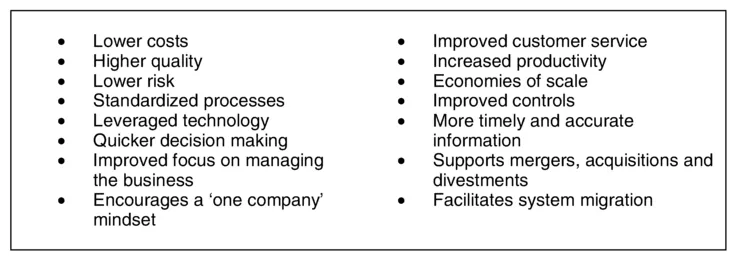![]()
PART I
The Basis for Shared Services
Even though the basic truth of having to produce a profit and manage costs is prevalent in most companies, more detailed and sophisticated analyses are necessary when calculating business cases and deciding on major organizational activities. As a result, reasons to go for an SSO or not to go do vary and the stated reasons vary too.
Reasons for Shared Services
Reasons for having a look at shared services can be external, internal and often are situational. Many transformations have been initiated because of major organizational trauma.
The company may desire certain outcomes, such as lower cost, reduction of risk or higher quality, or it may just want to use SSO as a change agent to push for an evolution of the mind-set inside the company. Later on in an SSO project, it is critical to know why shared services are initially implemented and what the goals are. It is useful to be honest in stating the goals, otherwise their fulfilment is endangered. Still, even if all participants are trying to be honest, goals can be conflicting and individual weightings of their importance can vary.
Figure 3 Shared services deliver value in a number of different ways
The top six reasons for an existing or planned finance SSO in the past are:
- reduction in administration costs (80%)
- grouping of similar tasks and expertise for a critical mass (62%)
- improvement of services and quality, accuracy and timeliness (62%)
- standardizing services (56%)
- reduction in headcount and salary/wages (47%)
- reduction in infrastructure costs (44%).
According to an ongoing global study by The Hackett Group (THG), 80% of companies name administrative cost savings as their primary reason for setting up shared services. This is clearly the main reason to go for SSO, although in previous years some studies showed quality reasons at the top of the list. In 2000 and 2001, the Shared Services Study by akris.com found quality improvements leading the list of drivers with 53% and 69% respectively (see Table 1 below).
Table 1 The four main reasons for setting up shared services
| Reasons | 2000 (%) | 2001 (%) |
| Better service, improvement in quality accuracy, timeliness of information | 69 | 53 |
| Reduction of general administration costs | 47 | 53 |
| Standardization of services | 15 | 48 |
| Optimization of working capital* | - | 42 |
European results from 2003 for the first time show that cost aspects are again leading the list of deployment reasons. The picture otherwise is similar: there is a whole list of reasons to think about SSO.
It seems that companies in 2000 and 2001 were maybe not quite honest with their answers. From 2002 onwards, the difficult economic situation made it possible and necessary to state the truth: that costs had to come down. On the other hand, the conflicting interests in goals set for an SSO project can also result in misleading metrics. Many reasons might be important and often quality improvement goals are reasons that everyone is interested in. Also, productivity gains can be accepted by most as a reasonable goal, since these gains do not define as such where they come from. The sources could be reductions of full-time equivalent (FTE) but could also be new IT tools supporting higher-activity volumes per FTE. Cost reductions might be the
Table 2 Current top six reasons for an existing or planned finance SSO
| Reduce administration costs | 79% |
| Improve service and quality, accuracy and timeliness | 69% |
| Reduce headcount and salary/wages | 64% |
| Group similar tasks and expertise for a critical mass | 61% |
| Standardize services | 44% |
| Simplify roll-out and IT systems support | 38% |
single most important factor to really go for SSO, but this goal is not desirable for the majority of discussion participants as they fear negative personal effects. More detailed research by THG displays exactly this set-up: between 56% and 71% name customer service, quality and productivity as reasons for setting up shared services – only 32% name cost savings. However, the one single most important reason given is the cost savings (42%).
Table 3 Decision factors for the set-up of a finance SSO
| | Important factor in the decision (%) | Single most important factor (%) |
| Process cost savings | 32 | 42 |
| Improved productivity | 71 | 10 |
| Improved process quality | 61 | 5 |
| Improved customer satisfaction | 56 | 0 |
The US perspective is often criticized as being outweighed by global research. It is useful to look at reasons both for US and other regions, such as Europe, in order to get a feel for both current drivers and possible future reasons. Since shared services is a concept that was initiated in the US and then swapped over to Europe and other regions, some of the US reasoning can be seen in other regions after a time lag of some years.
Comparing the global results with European results, it is interesting to note that the reasons are actually very similar. In 2003, 79% of European-based companies stated cost reduction as the number one reason; in 2002 it was 80%.
A deeper look at these developments shows that most reasons have diminished in importance (see Table 4). Grouping similar tasks, reducing redundant tasks, standardizing services and reducing infrastructure costs are still named as important
Table 4 Reasons for setting up SSOs in Europe
| | 2002 (%) | 2003 (%) |
| Reduce administration costs | 80 | 79 |
| Improve service and quality, accuracy and timeliness | 62 | 69 |
| Reduce headcount and salary/wages | 47 | 64 |
| Group similar tasks and expertise for a critical mass | 69 | 61 |
| Standardize services | 56 | 44 |
| Simplify roll-out and IT systems support | 33 | 38 |
| Reduce redundant tasks | 42 | 36 |
| Corporate strategy | 40 | 35 |
| Reduce infrastructure costs (premises, hardware, maintenance) | 44 | 28 |
| Enable flexible growth | 33 | 19 |
| Ability to serve a geographic area as a single market | 6 | 15 |
| Other cost savings | 13 | 11 |
| Improve working capital | - | 11 |
| As a temporary solution until non-critical company functions can be outsourced | 9 | 3 |
| Use of a Commissionare Model (shifting risks and returns to a more advantageous solution) | - | 1 |
| Other | 7 | - |
reasons by a range of companies, but by much fewer than before. Overall administrative cost reduction was almost unchanged (79% and 80%) and headcount and salary reduction increased from 47% to 64%. It is obvious that wage cost reduction by volume reduction and wage arbitrage from relocating to low-cost locations are, next to quality issues, being considered the main drivers and have increased significantly in relation to other reasons.
Quality issues also have increased in importance in Europe and are the second most important reason. However, two different scenarios can be behind this. Some companies actually have a quality issue in terms of data not being consistent and reliable and not available on a timely basis. In other SSO projects quality is regarded something like a framework factor. The targets are set based on cost reduction and productivity gains. Existing quality is thought to be good or at least sufficient to fulfil compliance requirements and needs of customers and partners. Hence it is expected to improve cost and productivity within existing quality levels.
Other relevant reasons can be traced back to value-based thinking. Companies engaged heavily in M&A can support integration and enhance chances for synergy realization substantially by using an SSO as a platform. Since in general, most expected synergies are difficult to realize, an SSO can add value to a deal in the sense that administrative services do not need to be bought or at least can be integrated ...

